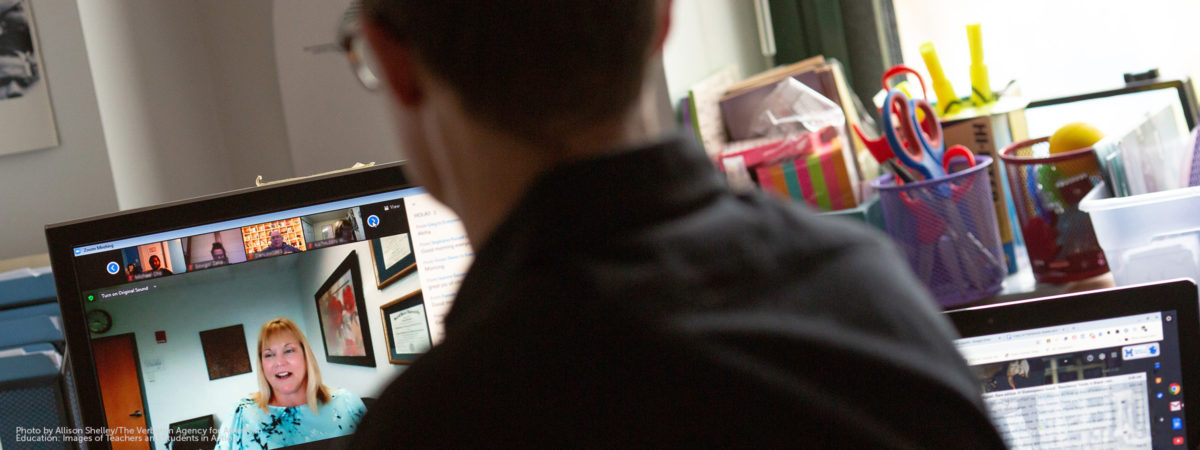When suddenly propelled into distance learning last spring, educators rose to the challenge to meet the needs of students and families. During the transition to online and home-based instruction, teachers and administrators turned to instructional technology coaches for support in the meaningful, effective use of technology to ensure learning continuity and minimize teaching and learning disruptions.
Verizon Innovative Learning Schools coaches were often tapped to help lead the transition in their districts, drawing on the program’s tech-focused professional development to prepare teachers to engage with students virtually. Even in schools outside of the Verizon Innovative Learning network, coaches reported that they were valued more by teachers and administrators than prior to the pandemic.
In our roles on the Verizon Innovative Learning Schools professional learning team, we have the unique opportunity to partner with instructional technology coaches all over the country. Since last March, coaches have shared with us how pandemic-driven needs have shifted their approaches to coaching teachers in the integration of technology.
Here is a non-exhaustive list of some of these shifts in coaching and how they have contributed to cultures of continuous growth and changes in how the instructional technology coaching role is perceived:
- The shift to distance learning has removed many logistical and scheduling challenges coaches previously faced in a traditional school day. Now, with video conferencing tools, coaches are able to “visit” more classrooms on a given day. As a result, coaches are able to engage in online coaching with more teachers. In fact, the coach at Andover Middle School in Miami, Florida, created a flexible schedule to allow teachers to book learning consultations, classroom visits, and one-on-one instruction.
- Similarly, as teachers work more than ever to integrate different technology tools and practices into their classrooms, many coaches are invited more regularly into virtual classrooms to model best instructional practices and co-teach.
- Within the virtual setting, coaches have been able to support teachers with managing virtual classrooms, as well as leverage learning management systems (LMS) to offer teachers feedback on lesson plans and instructional resources to improve student engagement in distance learning. At John A. Sutter Middle School in the Los Angeles Unified School District, the Verizon Innovative Learning Schools coach uses the district-adopted LMS for professional learning. This allows teachers to experience the platform as students do, provide asynchronous professional learning opportunities, and model best uses of the platform that teachers can easily translate into classroom use.
- Coaches have found many more opportunities to partner with and help teachers and school leaders to provide social-emotional support to students and cultivate inclusive learning spaces that honor students’ needs.
- Coaches are sharing, connecting, and growing together to improve their practice via various social learning opportunities, such as online professional learning communities (like Digital Promise’s new professional learning community (PLC) for coaches), social media groups, mentorships, on-demand learning assets, etc. As a result, coaches are creating supportive, collaborative learning cultures.
- To differentiate support, coaches are developing and curating just-in-time learning opportunities and resources (e.g., podcasts, videos, newsletters, infographics, narrated slides, tutorials, one-pagers), offering flexible meeting times, and leveraging various asynchronous communication methods. At Ruben Dario Middle School in Miami-Dade County Public Schools, the Verizon Innovative Learning Schools coach created a teacher online learning repository containing highlights of best instructional practices identified within their staff. The coach also curated content crowdsourced by other Verizon Innovative Learning Schools coaches in the district, such as student-created tech tool tutorials.
- As the demand for technology integration support increased, the vitality of identifying and building capacity in teacher leaders to support the staff also increased. Coaches have observed that formerly reluctant teachers are now shifting their perspectives and embracing the use of technology in their classrooms because of peer learning and collaboration. Coaches in Alum Rock Union School District in San Jose, California, have created collaborative presentations and portfolios to which teachers continually contribute tutorial videos, resources, and instructional artifacts to easily share best practices with one another.
- Coaches have taken on larger advocacy roles and are serving as liaisons between teachers and administration to communicate ongoing distance learning challenges and needs, as well as offer feedback and suggestions on district-approved applications, software, and systems.
Instructional technology is now undeniably viewed as an essential component to every district’s instructional plan, and with that, so should instructional technology coaches. Coaches and educators alike will continue to iterate, innovate, reflect, execute, and exude immense tenacity in the face of great uncertainty. Now more than ever, we must seek each other out and continue to expand our learning and collaborative communities.
In addition to instructional technology coaching, the Verizon Innovative Learning Schools initiative offers free online professional learning opportunities for all educators. Check out the first three Teacher Training Pathways, which are aligned to Digital Promise micro-credentials: Introduction to Instructional Technology Coaching, Evergreen Tools for Blended and Remote Learning, and Transitioning to Remote Learning.
Instructional coaches are invited to join Digital Promise’s new online Professional Learning Community for Coaches. Learn more and sign up.
